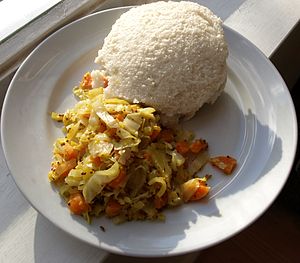- Contact Us
- FAQs
- [email protected]
- +256394010450

Food and culture
Food and culture
The Lugbara people of northwestern Uganda and northeastern DR Congo eat not only vegetable dishes, but also animals like goats, cows plus ope (guineafowls)[1] and catch insects like onya (white ants /winged termites) for food which is called nyaka in the standard Lugbara language used in Arua. Cassava flour sometimes mixed and mingled with millet or sorghum like posho or ugali is the staple food and is called enya(sa) [kalo or atap(a) in Ateso, fufu in West Africa] accompanied with a range of soup dishes. Rice, yams, potatoes (including boiling plus mashing dried mutere) and matoke (steamed or mashed bananas) are also eaten. Below is a list of some of the Lugbara-styled delicacies found in West Nile Restaurants, Ariwara Town (DR Congo), Arua Park in Kampala (Uganda's capital) and many homes or cafeterias that cherish traditional Lugbara cuisine.
Alanda/ Amboroko
The Lugbara antcake is made from small white ants and is like ombangulu. The trapping of ants is usually done during daytime (morning or evening). A flat grassless mass of soil, hard like an anthill, is called amboroko. A hole is dug, then mud mixed and a dome is then placed on top of the hole. The insects from underground gather in the raised mud while a song is sung, "Kuru, kuru, kuru!" plus drum beaten. An opening is created in the mud to let the insects out and the drummer sings, "Ba ki ilulua ilu, ma ilu ku!" [Translation: "People are creating an opening, am not!"]. When these insects are scooped within the mud, they are pounded soft with wings still on. Some people put them in leaves and boil, and then dry them until they harden. Otunyo (Yesterday's white ants) are pressed into an otaku pot. When it ferments/ smells after two days, it is pressed with a ladle. Then, leaves are put on it in the pot. It can be added to food like agobi (fresh pumpkin leaves chopped and prepared). It is not put in beans or meat. Akuruma is collected in the mornings and there is always a lot of noise made from empty tins, jerrycans, jingles, etc. Ifu/ Ofu is gathered in the late afternoon (3–4 pm) with children singing. Ica is the last type usually gathered before dusk (6–7 pm).